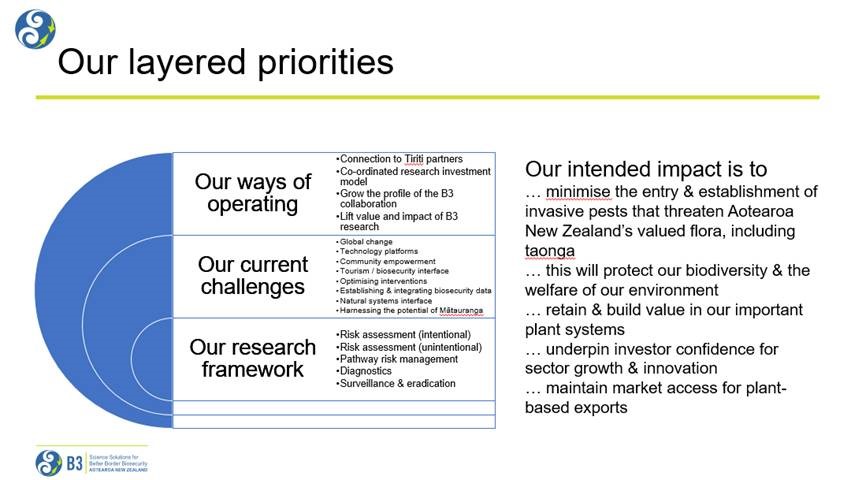New B3 project leaders shared details of their research and its intended impact with more than 100 participants at the recent virtual Science Partnership Forum. B3’s kahui also discussed a Tiriti-anchored research programme.
B3 holds the forum twice a year to bring together researchers from across the collaboration, PhD students working on biosecurity-related topics, international scientists, representatives from partner organisations, the Biological Heritage National Science Challenge (BHNSC), stakeholders and end users.
B3 director David Teulon said he was thrilled more than 100 people took part in the forum despite a decision to hold it online because of COVID-19.
Desi Ramo of the BHNSC said he “really enjoyed the B3 SPF … Although discussion is much harder to facilitate in the virtual setting, I think there were some good questions and points raised.”
James Buwalda (B3 Chair), Holden Hohaia (B3 Collaboration Council) and Alby Marsh (B3 Māori Research Lead Pourangahou) shared information on the strategic imperatives of B3, its research priorities, progress with our Māori strategy and how this integrates with our day-to-day research projects. Andrew Spelman of MPI updated attendees on the impact of COVID-19 on the country’s biosecurity system.
A large portion of the day-long forum involved leaders of new research projects sharing details of their work. David said a range of exciting new projects began in June 2021 (read about the new projects) with a breath of topics including the testing and development of cutting edge technology, genetics, and the development of ways to pre-empt pressing biosecurity threats such as Xylella.
He shared details of how all the work of B3 – its research, its strategic imperatives and culture – is focused on the tangible outcome of preventing and minimising the entry of threats to our productive and native plants. See the diagram below about how it all comes together.

David said 2022 will be particularly exciting as about $4 million in research funding would be allocated to new projects or extensions of successful work already undertaken.
James Buwalda said the collaboration had achieved a lot in more than 15 years. It now had a strong team, capabilities, leadership and meaningful connections to the national and international border biosecurity community.
“We are consistently looking to be more relevant, industry-focused, efficient and focused on delivering value from the research. Our partnership with Māori has become an important and strong focus in the past year and we will see this grow in significance and impact in the next 12 months.”
